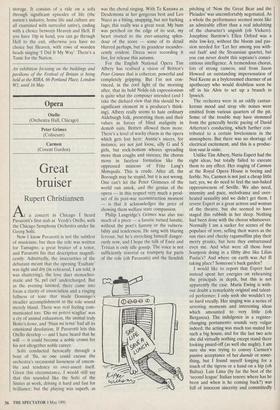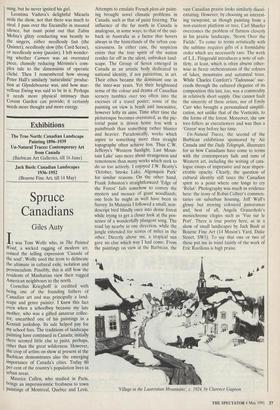Opera
Otello (Orchestra Hall, Chicago) Carmen (Covent Garden)
Great bruiser
Rupert Christiansen
At a concert in Chicago I heard Pavarotti's first stab at Verdi's Otello, with the Chicago Symphony Orchestra under Sir Georg Solti.
Now I know Pavarotti is not the subtlest of musicians, but then the role was written for Tamagno, a great bruiser of a tenor, and Pavarotti fits that description magnifi- cently. Admittedly, the insecurities of the debutant meant that the opening 'Esultate' was tight and dry (in rehearsal, I am told, it was shattering), the love duet monochro- matic and 'Si, pel ciel' undercharged. But as the evening latened, there came into focus a clarity of enunciation and a ringing fullness of tone that made Domingo's steadier accomplishment in the role sound merely bland. There was real feeling com- municated too: 'Di° mi potevi scagliar' was a cry of animal exhaustion, the animal truly Boito's leone, and `Niun mi tema' had all its emotional desolation. If Pavarotti lets this Otello develop — and I have heard that he will — it could become a noble crown for his not altogether noble career.
Solti conducted heroically through a bout of 'flu, so one could excuse the orchestra's occasional looseness of ensem- ble and tendency to over-assert itself. Given this circumstance, I would still say that this sounded like the Solti of the Sixties at work, driving it hard and fast for brilliance; but the playing was superb, as was the choral singing. With Te Kanawa as Desdemona at her gorgeous best and Leo Nucci as a biting, snapping, but not barking Iago, this really was a great treat. My bum was perched on the edge of its seat, my heart riveted to the ever-amazing splen- dour of the score — some of its detail blurred perhaps, but its grandeur incandes- cently evident. Decca were recording it live, for release this autumn.
For the English National Opera Tim Albery has realised a vision of Britten's Peter Grimes that is coherent, powerful and completely gripping. But I'm not con- vinced, in the cool light of the morning after, that its bold Nolde-ish expressionism is quite what the composer intended (and I take the diehard view that this should be a significant element in a producer's think- ing). Albery really seems to hate ordinary Aldeburgh folk, presenting them and their values as forces of blind malignity in demob suits. Britten allowed them more. There's a level of wacky charm in the opera which gets lost here: Auntie's nieces, for instance, are not just loose, silly G and S girls, but rock-bottom whores spreading more than coughs and sneezes; the chorus move in faceless formation like the oppressed minions of Fritz Lang's Metropolis. This is crude. After all, the Borough may be stupid, but it is not wrong. One can't let the Peter Grimeses of the world run amok, and the genius of the opera — in this respect very much a prod- uct of its post-war reconstruction moment — is that it acknowledges the price of showing them welfare state compassion.
Philip Langridge's Grimes was also too much of a piece — a fanatic turned lunatic, without the poet's fantasy or the vulnera- bility and tenderness. He sang with blazing fervour, but he's stretching himself danger- ously now, and I hope the talk of Enee and Tristan is only idle gossip. The voice is not sufficiently tenorial or trumpety for parts of the role (oh Pavarotti) and the fiendish pitching of 'Now the Great Bear and the Pleiades' was uncomfortably negotiated. As a whole the performance seemed more like an admirable effort than a real inhabiting of the character's anguish (oh Vickers). Josephine Barstow's Ellen Orford was a mite low-key, without the bloom and pas- sion needed for 'Let her among you with- out fault' and the Straussian quartet, but you can never doubt this soprano's consci- entious intelligence. A tremendous chorus, lots of strong cameos, and from Jason Howard an outstanding impersonation of Ned Keene as a brylcreemed charmer of an apothecary who would doubtless soon be off in his Alvis to set up a branch in Ipswich.
The orchestra were in an oddly cantan- kerous mood and stray vile noises were emitted from various quarters of the pit. Some of the trouble may have stemmed from the generally hectic pacing of David Atherton's conducting, which further con- tributed to a certain lovelessness in the atmosphere. But there was no shortage of electrical excitement, and this is a produc- tion vaut la visite.
Unlike Tim Albery, Nuria Espert had the right ideas, but totally failed to execute them to any effect. Her staging of Carmen at the Royal Opera House is boring and feeble. No, Carmen is not just a cheap little tart; yes, we do need to feel the sun-baked oppressiveness of Seville. We also need, intensity and pace, melodrama and over- heated sexuality and we didn't get them. I revere Espert as a great actress and woman of the theatre, but she seemed to have staged this rubbish in her sleep. Nothing had been done with the chorus whatsoever. Normally I am a sucker for scenes of the populace of yore, selling their wares as the sun rises and cheeky ragamuffins play their merry pranks, but here they embarrassed even me. And what were all those bons bourgeois doing in a filthy dive like Lilias Pastia's? And where on earth was Act II taking place? Someone's back garden?
I would like to report that Espert had instead spent her energies on rehearsing the principals in depth, but this is not apparently the case. Maria Ewing is with- out doubt a remarkably original and talent- ed performer; I only wish she wouldn't try so hard vocally. Her singing was a series of arresting moments and interesting ideas which amounted to very little (oh Berganza). The indulgence in a register- changing portamento sounds very vulgar indeed; the acting was much too muted for such a big house, and for the last two acts she did virtually nothing except stand there looking pissed-off (as well she might). I am sure she was trying to convey Carmen's passive acceptance of her duende or some- thing, but I found myself longing for a touch of the tigress or a hand on a hip (oh Baltsa). Luis Lima (by far the best of the 'second league' Italian tenors: where has he been and when is he coming back?) was full of innocent sincerity and committedly
sung, but he never ignited his girl.
Leontina Vaduva's delightful Micaela stole the show, not that there was much to steal. I pass over the Escamillo in stunned silence, but must point out that Zubin Mehta's glitzy conducting was beastly to the singers, either needlessly fast (the Quintet), needlessly slow (the Card Scene), or needlessly noisy (passim). I left wonder- ing whether Carmen was an overrated piece, clumsily reducing Merimee's com- plex tale to the dimensions of operatic cliché. Then I remembered how strong Peter Hall's similarly 'naturalistic' produc- tion at Glyndebourne was, and how mar- vellous Ewing was said to be in it. Perhaps it needs more physical intimacy than Covent Garden can provide; it certainly needs more thought and more energy.



















































 Previous page
Previous page